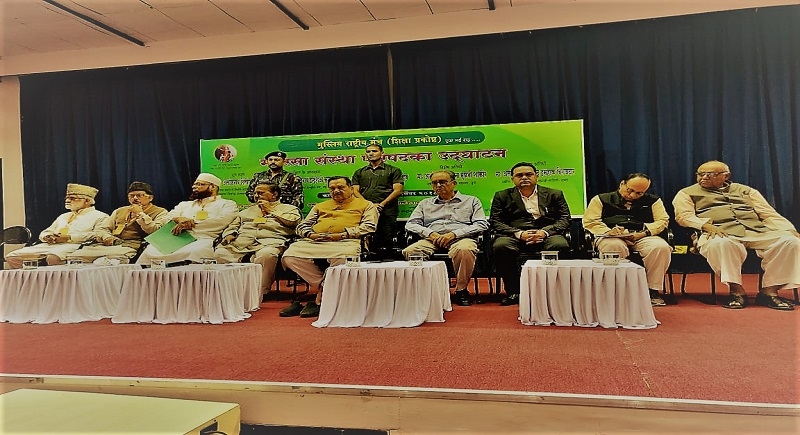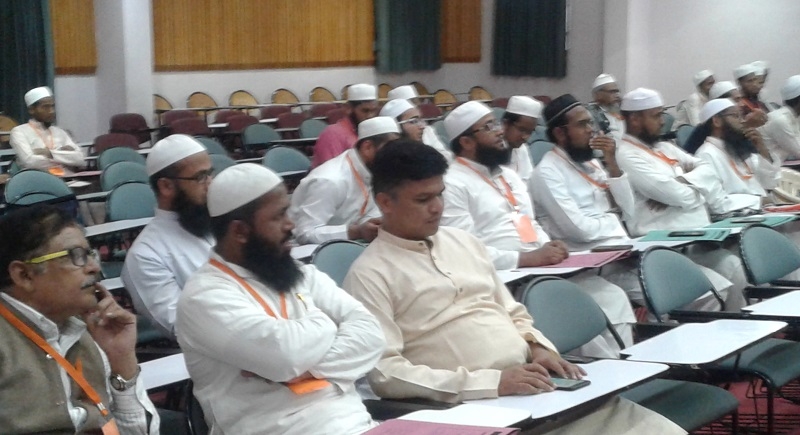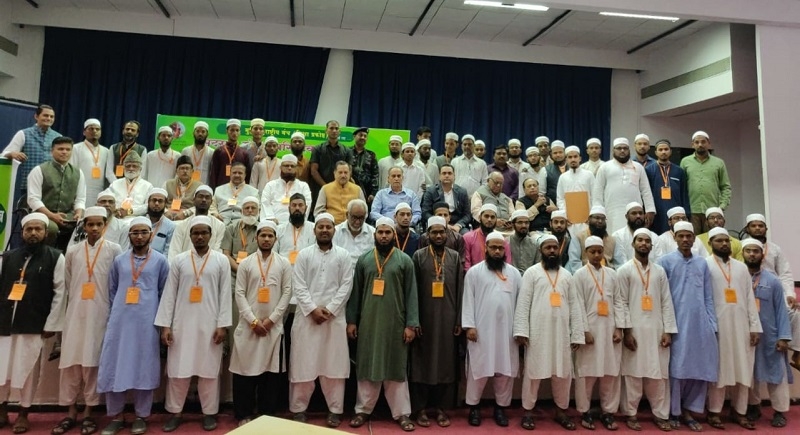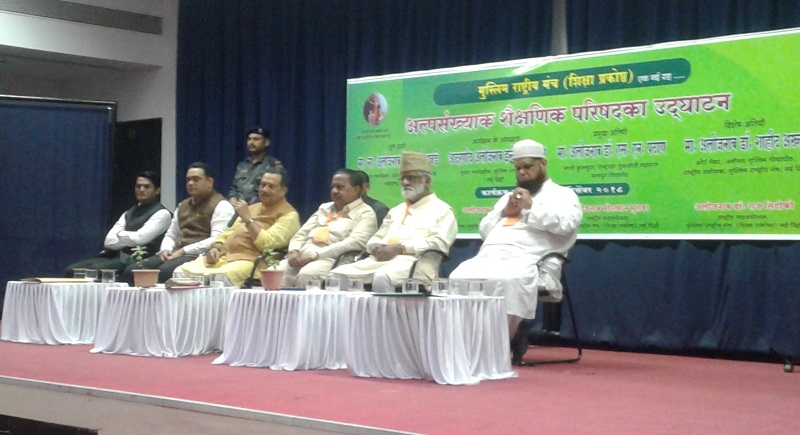Madarsas should impart modern education along with religious instructions


MRM Patron and Senior RSS leader Indresh Kumar was the inspiring source for the two-day event attended by 125 Islamic scholars, Maulanas, Moulvis and Directors of Minority Institutions. His free and frank interaction and lucid style earned him most admirers from among those participants most of whom met him for the first time.
The deliberations of the first day began with the introductory remarks by Latif Magdum who explained the objective of the seminar stressing the importance of education for the Muslim boys and girls.
He also informed the gathering that the MRM had founded Shahid Ashfaq Ullah Khan National Memorial Trust to help and assist the aspiring students in their studies. He said that the MRM had given a slogan emphasizing importance of education – “Aadhi roti khayanege, Bachchon ko Padhayenge; Taalim Zindgi ke liye aur Zindagi Vatan ke liye” and always preferred propagation of the vision of the Prime Minister Narendra Modi – “Ek haath me Quran aur Ek haath me Computer” to bring the Muslim students at par with other community boys.
Former Vice-Chancellor of Rashtrasant Tukdoji Maharaj Nagpur University (RTMNU) Dr S N Pathan in his address stressed that in this era of technology and science, Muslim students must get modern education along with religious teachings. Muslims are still most backwards because of the lack of modern education.
Quoting Sir Sayyad Ahmed, founder of Aligarh Muslim University (AMU) Dr Pathan said that Madarsas should teach English and other subjects to their students. He said that the Madarsa education is most important to make the students better human beings. But modern education is also necessary. He floated an idea of setting up schools that would act as a bridge between the Madarsas and Universities and bring them in the national mainstream.
Dr Pathan said that India is a Hindu majority country. The Hindu society here was rendered weak and spineless due to slavery of hundreds of years. It is the Rashtriya Swayamsevak Sangh (RSS) that organized the Hindu society and strengthened. But this did not mean hatred of Muslims. India has a tradition of welcoming, respecting and accepting all the religions of the world. The identity of people in this country is naturally Hindu and their nationality is called Hindutva, he explained.
He stressed the need to modernize the syllabus of the Madarsas to include information of historical icons like Sri Rama and Sri Krishna and also to make Hindus understand Islam. He said that Muslims in India never learnt about the Hindus and their religion and in turn failed to make them understand the Islam which is essentially a religion of peace and brotherhood.
Dr Pathan categorically stated that Muslims in India are not minorities but from the mainstream and the same land. We have to assimilate the inspiration of this country and develop the Bharat of future as per the vision of Swami Vivekananda who visualized India with assimilation of Islam body and Vedantic mind for the better guidance of humanity.

He said our role model is Dr APJ Abdul Kalam and not the terrorists like Yakub Memon. He appealed to the madarsas to assume a leading role in resolving controversial issues and teach the students to become true followers of Islam and its prophet.
He said that along with the religious instructions, madarsas should teach subjects like science, math, social studies, English and history. He also narrated that there are schemes of government for upgradation and improvement of madarsas.
In his presidential address Indresh Kumar appealed the participants to disseminate instructions to the students so that they become true and pious Muslims and patriotic citizens. Describing this seminar as ‘divine’ (khudai) he said that MRM is a non-political organization as it believed that politics divides while culture unites the people.
He said that the Quran mentions that Allah had sent 1.24 lakh prophets or ‘ambias’ to the earth to guide different communities at different times in the human history and Mohammad was the last prophet. No prophet has ever spoken against each other but their followers fight against each other. This should be stopped; he added underlining the need to get knowledge from Quran, Hadis and Sunnat of the Prophet to understand Islam properly.
Religious instructions are necessary to elevate the human being to the stature of a ‘farsihta’. But the worldly education was necessary to understand culture, to love motherland and to respect other religions and faiths, he added.
Quran does not teach fighting with other religions. The teaching ‘Lakum Dinekun Valaya din’ means you follow your religion, I follow mine and we will respect each other’s religion’. Therefore, religion is a philosophy that teaches us to stay together. We must understand this and make others understand properly. This is the duty of the religious scholars and clergy. Political leaders instigate against each other while the religious leaders pacify, he added.
However, to respect the other religions it is necessary to know them first. Then only we will be able to respect them, he said.
Referring to the practice of triple talaq, Indresh Kumar said that it was branded as the crime that is most despised by the Khuda. And the process of talaq is made so complicated in the Quran that it becomes almost impossible to separate wife and husband. But the inhuman practice of instant triple talaq was included in Islam which was surely a ‘satanic work’. The MRM launched a campaign against this inhuman practice and succeeded in getting justice to the 8.5 crore Muslim women.
Quoting the prophet he said that the prophet had asked people to go even to China to learn something good and useful. Arab and China had no better bilateral relations then but the Prophet was aware of the importance of education and was in favor of obtaining it even from the enemy.
He also said that the Prophet did not propagate violence and did not follow the path of violence. How, then terrorism, violence, riots have entered into Islam, he asked.
Speaking of nationalism or ‘vatan parasti’, Indresh kumar referred to ‘Hubbal Vatani’ concept of Quran. Protecting and sacrifice for motherland is held in very high esteem in Quran. Out motherland – madare vatan – is Hindustan and protecting it is our topmost duty. During the freedom struggle Ashfaqullah Khan, Begum Hazrat Mahal, Bahadurshah Zafar, sacrificed their lives and they are our ideals and not terrorists like Kasab or Yakub Memon. We must strive to become a true Muslim and a true Indian or Hindustani. We were Hindustani, we are Hindustani and we will remain Hindustani.
The progeny of those who left for Pakistan in 1947 are suffering for want of citizenship. Pakistan had not recognized them as citizens of their land and thus they are rendered ‘mujahirs’ and they are forced to demand a separate homeland for them.
Indresh Kumar said that All India Muslim Personal Law Board (AIMPLB) is devil’s creation. They called for setting up Sharia courts but the Muslims of India responded negatively to them. Only 10 applications were received, seven out of them were found to be fake and the remaining three did not pursue the matter further.
He said that people of Hindustan had accepted all the religions, respected all, admired them and adopted them with reverence. Thus, Hindustan cannot be brought under the category of ‘Darul Harab’ or ‘Darul Islam’. It is the ‘Darul Aman’ the land of peace. It is that divine land which provided the breeze of solace to the Prophet when he found himself in times of distress and tension.
Referring to Babri Mosque issue Indresh Kumar said that naming a place of worship after any individual is against Islam and insult to Prophet. He said that if Kaaba in Mecca, Vatican or Golden Temple and Bodhgaya cannot be broken or shifted similarly Ramjanma sthan Ayodhya cannot be shifted or demolished. There should be built a grand temple dedicated to Sri Ram, who has been referred to by Islamic Scholars as ‘Imam-e-Hind’ since ages.
On the second day of the seminar Satish Tripathi, former bureaucrat and expert on Madarsa underlined the need to modernize them lest they lose the direction and become rudderless. He said that a detail survey of all the madarsas should be conducted to gather the correct information and make a definite assessment. There are schemes for upgrading and modernizing madarsas both at the state and the central level and the madarssas should take advantage of them.
Maulana Mufti Shakeer, a noted Islamic scholar from Pune said that it is a heroic task to run the madarsa. He called for creating awareness among the Muslims for education. He also said that India is his favoured nation and he had opted for it. We are all one and our ancestors are also one, he said with added emphasis.

Mohd Ishaq Birajdar, thinker and writer said that there is a need to change our way of thinking. He said Hindustan is our heaven and it is our duty to make it heaven on the basis of Islamic tenets of brotherhood, peace, and security. Islam is a religion of love, compassion and peace. It connects people and not separates them, he added.
Press Council Member and National Convener of MRM from Lucknow Raza Rizvi said that the message of this workshop will travel far and wide and help in eliminating hatred and spreading brotherhood and peace. Madarsas should introduce the Muslim children to the modern education, he said.
A resolution was passed that stated the importance of introducing the modern education along with religious instructions in the madarsas with government help and assistance. The madarsas will have Dr APJ Abdul Kalam as their ideal; they will strive for educating each and every child; they will spread patriotism and fraternity and strive to make Hindustan a world leader in future.